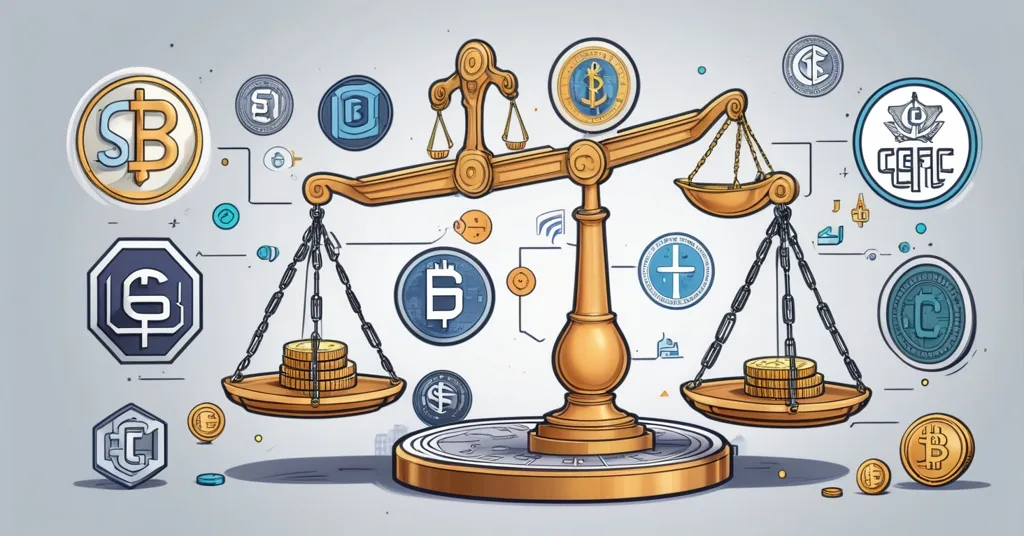U.S. Crypto Bill Unveiled: SEC, CFTC Roles Defined, DeFi Exemptions Added

Major Crypto Bill Finally Here: Key Details
The U.S. crypto market structure bill, a game-changer for the digital asset landscape, was released as a discussion draft on Monday. This legislation, titled the “Digital Asset Market Structure and Investor Protection Act” (H.R.5745), aims to clarify the roles of the Securities and Exchange Commission (SEC) and the Commodity Futures Trading Commission (CFTC). Here’s a breakdown of the key elements:
- SEC to regulate investment contract offerings
- CFTC to oversee commodities
- Decentralized test and “mature” blockchain criteria introduced
- Net worth thresholds removed, expanding investor access
- Exemptions for certain DeFi protocols
- Stablecoins defined without security classification amidst Senate challenges
This bill seeks to establish a regulatory framework for digital assets, addressing the confusion that has plagued the industry. The SEC will oversee cryptocurrency offerings deemed investment contracts—agreements where investors expect profits from the efforts of others—while the CFTC will handle commodities, digital assets with secure transaction histories and decentralized transfer capabilities. This clear delineation is crucial for creating a coherent regulatory environment. For more on the roles of the SEC and CFTC, you can read an analysis.
The introduction of a decentralized test is a pivotal feature. A project is considered decentralized if no single party has complete control over it, and it must disclose holders with more than 10% of the supply. This test reflects a keen understanding of blockchain technology’s unique nature and determines when a project shifts from SEC to CFTC jurisdiction. Imagine a blockchain like Ethereum transitioning smoothly from SEC oversight to CFTC once it meets these criteria—it’s like a crypto coming-of-age story!
The bill also defines what constitutes a “mature” blockchain: one that has fundamental value, is substantially developed, functional, open, impartial, rules-based, and not centrally controlled or owned (with less than one-fifth of the supply). Think of a mature blockchain as a seasoned company, established and reliable, like a digital blue-chip stock. This definition aims to recognize the maturity and stability of certain blockchain networks, potentially fostering greater investor confidence.
By removing net worth thresholds, the bill opens the crypto market to a broader range of investors. This move could democratize access to digital assets, but it also raises questions about investor protection and market stability. It’s like opening the doors to a crypto party—everyone’s invited, but who’s keeping an eye on the punch bowl? For more on the impact on investor access, see this article.
The legislation offers exemptions for non-custodial decentralized finance (DeFi) protocols that do not exercise discretion. These are DeFi platforms where users retain control of their assets without intermediaries, potentially encouraging innovation in the DeFi space while ensuring regulatory oversight remains where it’s most needed. For more on DeFi protocol exemptions, see this discussion.
On the stablecoin front, the bill defines them without classifying them as securities. However, stablecoin legislation faces challenges in the Senate, with some Democrats considering withdrawing their support. Senate Minority Leader Chuck Schumer has expressed concerns about Tether, highlighting the complexities involved in regulating these digital assets. It’s like trying to pin down a digital dollar—stablecoins keep regulators on their toes! For more on the stablecoin regulation challenges, see this report.
Industry experts have weighed in on the bill. Justin Slaughter from Paradigm noted:
“Overall, this bill again would make the CFTC the dominant crypto regulator, but still gives the SEC jurisdiction until a network establishes decentralization.”
Meanwhile, Faryar Shirzad, Chief Policy Officer at Coinbase, emphasized:
“There’s no understating the urgency and bipartisan partnership with which Congress is moving to unlock crypto innovation in the United States.”
Despite the bill’s promising aspects, it’s still in the “Introduced” stage, having been referred to the Subcommittee on Commodity Markets, Digital Assets, and Rural Development. As it progresses, the crypto community will be watching closely to see how these regulations evolve and what impact they will have on the future of digital assets in the U.S. For more detailed discussion on the bill, check out this Reddit thread.
From a Bitcoin maximalist perspective, these regulations could be a double-edged sword. Bitcoin, with its established network and clear commodity status, might benefit from the CFTC’s oversight, potentially accelerating its adoption as a mainstream financial asset. However, the bill’s emphasis on decentralization and mature blockchains could also open doors for altcoins and other innovative protocols, challenging Bitcoin’s dominance in certain niches.
The concept of effective accelerationism (e/acc) suggests that these regulations could either hinder or accelerate the adoption of blockchain technologies and decentralization. If implemented thoughtfully, they could foster a more robust and innovative crypto ecosystem, aligning with the principles of disrupting the status quo and promoting financial freedom.
Key takeaways and questions:
- What are the main objectives of the new crypto market structure bill?
The bill aims to establish a regulatory framework for digital assets, clearly delineating the roles of the SEC and CFTC, and introducing a decentralized test and exemptions for certain DeFi protocols.
- How does the bill differentiate the roles of the SEC and CFTC?
The SEC will regulate cryptocurrency offerings deemed investment contracts, while the CFTC will oversee commodities.
- What criteria must a project meet to be considered decentralized?
A project is considered decentralized if no single party has complete control, and holders controlling more than 10% of the supply must be disclosed.
- What is a “mature” blockchain according to the bill?
A blockchain is deemed “mature” if it has fundamental value, is substantially developed, functional, open, impartial, rules-based, and not centrally controlled or owned (less than one-fifth of the supply).
- How does the bill affect investor access to the crypto market?
The bill removes net worth thresholds, opening the market to more investors.
- What exemptions are provided for DeFi protocols?
Non-custodial DeFi protocols that do not exercise discretion may be exempt from regulation.
- How does the bill classify stablecoins?
The bill defines stablecoins without classifying them as securities.
- What challenges are facing stablecoin legislation in the Senate?
Stablecoin legislation faces challenges with some Democrats considering withdrawing support, and concerns about Tether from Senate Minority Leader Chuck Schumer.



